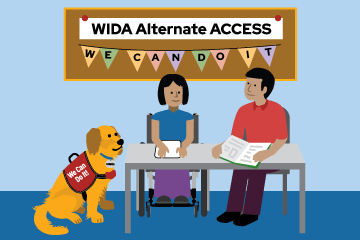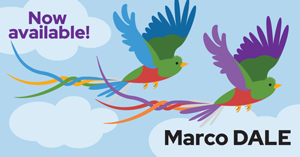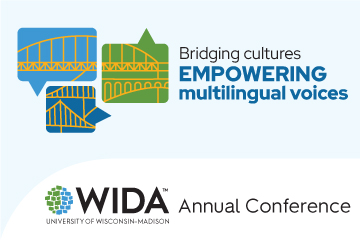This WIDA Snapshot focuses on how you can gather information and reflect on the language and cultural goals families have for their children.
 Equitable language-focused family engagement includes developing collaborative relationships with families of multilingual children. Research has shown that families of young multilingual children want their children to maintain their home language and cultural practices (e.g., Mancilla, Spalter, Cuéllar, & Shekar, 2020). This snapshot extends on previous conversations about family engagement. It focuses on how you can gather information and reflect on the language and cultural goals families have for their children.
Equitable language-focused family engagement includes developing collaborative relationships with families of multilingual children. Research has shown that families of young multilingual children want their children to maintain their home language and cultural practices (e.g., Mancilla, Spalter, Cuéllar, & Shekar, 2020). This snapshot extends on previous conversations about family engagement. It focuses on how you can gather information and reflect on the language and cultural goals families have for their children.
Language and Culture
Language and culture are linked. Families’ language goals will be, in many cases, connected to their cultural goals. For example, a previous WIDA focus group participant described the language and cultural goals that she has for her children:
My hope is that they can be bilingual. Part of that would be that they are bicultural as well. I don’t know exactly what that would mean…the reason why that is important is I feel like it’s a part of them and I try to encourage them to explore that part of their family, their culture, and to grow up to appreciate it and value it.
As the WIDA Can Do Philosophy describes, the more educators know about and respond to families’ cultural backgrounds, home languages, and community experiences, the more they will be prepared to ensure that multilingual children will feel that they belong, and can learn and thrive. Below are ways you can enact the WIDA Can Do Philosophy and take a culturally and linguistically responsive approach to gathering information and reflecting on what you gather.
Learning About Families’ Language and Cultural Goals
How can you collaborate with families to learn about their language and cultural goals? Consider using the questions below in your ongoing, two-way conversations with families in their preferred language.
- What are your goals and dreams for your child’s language use? Would you like your child to be able to speak your family’s home language(s) as an adult?
- What are your goals and dreams for how your child identifies with your culture(s)? Are there things your family values you would like me to know about?
- Given your language and cultural goals, how could we help you and your child feel welcome in our early care and education environment?
- How would you like me to support your child using your home language(s) in our program?
- How can I support you to meet the goals you have for your child? (For example, connecting with other families who share your cultural and language goals, sharing information about the benefits of bilingual/multilingual language development, and sponsor outings, speakers, or events identified by families.)
Collaborate – partner with multilingual families to learn their language goals, cultural goals, and ideas for how to enact them in your early care and education setting.
Get out and about – meet families where they are, explore places and events, visit neighborhoods, listen to how language is used. Be inquisitive and respectful – listen and observe; remember you are a learner.
Enact a can do approach – focus on strengths; remember, all cultural and linguistic practices are assets and can support children in learning.
Check for bias – reflect to check on possible assumptions, deficit thinking, and judgments you may be making.
Examine your practices and resources – use the information you gather to examine your environment, resources, observations, and instruction; look for possible stereotypical or culturally inappropriate representations, omissions, or assumptions in your practices and resources.
Revisit, revise, update – continually connect with families; add information you gather.
Mancilla, L., Spalter, A., Cuéllar, D., & Shekar, A. (2020). Young multilingual children in Maryland: Exploring parent perceptions of children’s language development, family engagement practices, and decision-making about early care and education. WIDA Research Report. WIDA, University of Wisconsin-Madison, Wisconsin Center for Education Research. https://earlychildhood. marylandpublicschools.org/system/files/filedepot/20/wida_ report_young_multilingual_children_in_maryland.pdf





